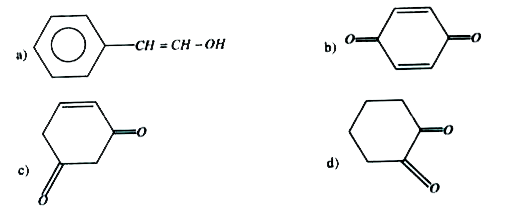The dissolution of ammonia gas in water does not obey Henry's law. On dissolving. a major portion of ammonia molecules unite with H2,O to form NH4,OH molecules. A portion of the latter again dissociates into NH+4, and OH− ions. In solution thercfore, we have NH3, molecules, NH4,OH molecules and NH+4, ions and the following equilibrium exist:
NH3(g) (pressure P and concentration c) →NH3(l)+H2,O→NH4,OH→NH+4→,+OH−
Let c1,mol/L of NH3, pass in liquid state which on dissolution in water forms c2 mol/ L of NH4,OH. The solution contains c3mol/L of NH+4, ions.
Degree of dissociation of ammonium hydroxide isSolution in Telugu
c1
c3/c1
c3/c
c3/c2
The correct Answer is:D
α2=C3C2
Topper's Solved these Questions
- IONIC EQUILIBRIUM Book:AAKASH SERIESChapter:IONIC EQUILIBRIUM Exercise:PRACTICE SHEET (EXERCISE -II LEVEL -II (ADVANCED ) (Matrix Matching Type Questions))
Explore 10 Videos
- IONIC EQUILIBRIUM Book:AAKASH SERIESChapter:IONIC EQUILIBRIUM Exercise:PRACTICE SHEET (EXERCISE -III LEVEL -I (MAIN) (Straight Objective Type Questions))
Explore 26 Videos
- IONIC EQUILIBRIUM Book:AAKASH SERIESChapter:IONIC EQUILIBRIUM Exercise:PRACTICE SHEET (EXERCISE -II LEVEL -II (ADVANCED ) (More than one correct answer Type Questions))
Explore 6 Videos
- HYDROGEN AND ITS COMPOUNDSBook:AAKASH SERIESChapter:HYDROGEN AND ITS COMPOUNDSExercise:QUESTIONS FOR DESCRIPTIVE ANSWERS
Explore 20 Videos
- ISOMERISM Book:AAKASH SERIESChapter:ISOMERISM Exercise:ADDITIONAL PRACTICE EXERCISE ( PRACTICE SHEET (ADVANCED) INTEGER TYPE QUESTIONS)
Explore 10 Videos
Similar Questions
List-IList-II(A)1×10−8M KOHP.pH=1.3(B)1×10−8MHBrQ.pH=6.95(C)1MHCI+1MNaOHR.pH=7.0414(D)0.02MH2SO4S.pH=7acidic solution
View SolutionTo a buffer solution of CH3,COOH and CH3,COONa, some HCI is added. Then the reaction involved is
View Solution100 ml of 0.1 M HCl and 100 ml of 0.1 M HOCN are mixed . What is the concentration of ..OCN−.., and pH of the solution ? (Ka=1.2×10−6)
View SolutionWhy the use of hard water is disadvantages?
View SolutionTautomerism is exhibited by X number of compounds among the following. What is X.

View SolutionA solution of 0.01M concentration of NH4OH is 2.6% dissociated. Calculate [H+],[OH−],[NH+4],[NH4OH] and pH of solution.
View SolutionAssertion: The pH of NH_(4)OH remains unchanged on addition of NH_(4)Cl . Reason : Addition of NH_(4)Cl suppresses the dissociation of NH_(4)OH due to common ion effect.
View SolutionWhat concentration of OH^(-) ions will reduce NH_(4)^(+) ion to 2xx10^(-5)M in 0.4M solution of NH_(4)OH ? K(b)(NH_(4)OH)=1.8xx10^(-5)
View Solutionयदि NH4OH<⇒NH+4+OH− ,अभिक्रिया के प्रारम्भ में 25 अणु है और इनमे से केवल 5 अनु वियोजित होते है, तो NH4OH की वियोजन मात्रा क्या होगा?
View SolutionAssertion: The dissolution of ammonia in water does not follow henry's law. Reason: Ammonia undergoes ionisation in watrer as NH_(3)+H_(2)O hArr NH_(4)^(+)+OH^(-)
View Solutionयदि NH4OH⇔NH+4+OH− अभिक्रिया के आरम्भ में 25 अणु है और इनमे से केवल 5 अणु वियोजित होते है तो वियोजन की मात्रा की गणना कीजिए ।
View SolutionNH_(3) and H_(2)O form NH_(4)OH by
View SolutionFor the following equilibrium
NH3+H2O⇔NH+4+OH−
calculate the equilibrium constant, if for the equilibrium,
NH+4+H2O⇔NH4OH+H+
the equilibrium constant is 5.5×10−10
View SolutionEquilibrium constant for reaction NH4OH(aq)+H+(aq)⇔NH+4(aq)+H2O(l)
1.8×199.
Hence equilibrium constant for ionization NH3+H2O⇔NH+4(aq)+OH−(aq) is x×10−6. The value of 'x' is
View SolutionThe presence of NH4Cl in NH4OH solution will ............. the degree of dissociation of NH4OH.
View SolutionThe dissolution of ammonia gas in water does not obey Henry's law. On dissolving. a major portion of ammonia molecules unite with H2,O to form NH4,OH molecules. A portion of the latter again dissociates into NH+4, and OH− ions. In solution thercfore, we have NH3, molecules, NH4,OH molecules and NH+4, ions and the following equilibrium exist:
NH3(g) (pressure P and concentration c) →NH3(l)+H2,O→NH4,OH→NH+4→,+OH−
Let c1,mol/L of NH3, pass in liquid state which on dissolution in water forms c2 mol/ L of NH4,OH. The solution contains c3mol/L of NH+4, ions.
Total concentration of ammonia, which can be determined by volumetric analysis is equal to:
View Solution